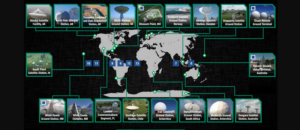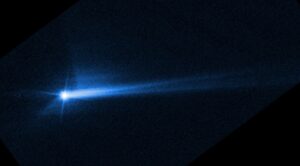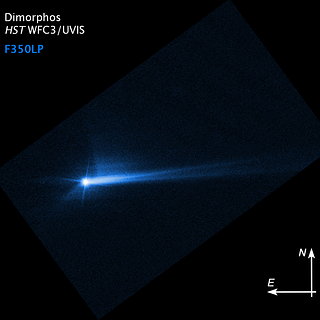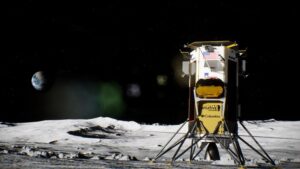NASA taps KSAT and SpaceLink for communications studies
Tuesday, 11 October 2022 20:10
NASA has awarded contracts to KSAT Inc. and SpaceLink as part the space agency’s campaign to begin investigating commercial sources for future space communications services.
The post NASA taps KSAT and SpaceLink for communications studies appeared first on SpaceNews.
NASA’s DART spacecraft changes asteroid’s orbit
Tuesday, 11 October 2022 19:30
A NASA spacecraft that deliberately collided with a near Earth asteroid last month changed its orbital period by more than a half-hour, exceeding expectations for the planetary defense demonstration.
The post NASA’s DART spacecraft changes asteroid’s orbit appeared first on SpaceNews.
NASA spaceship deflected asteroid in test to save Earth
Tuesday, 11 October 2022 18:38 NASA on Tuesday said it had succeeded in deflecting an asteroid in a historic test of humanity's ability to stop an incoming cosmic object from devastating life on Earth.
The fridge-sized Double Asteroid Redirection Test (DART) impactor deliberately smashed into the moonlet asteroid Dimorphos on September 26, pushing it into a smaller, faster orbit around its big brother Didymos, said NASA c
NASA on Tuesday said it had succeeded in deflecting an asteroid in a historic test of humanity's ability to stop an incoming cosmic object from devastating life on Earth.
The fridge-sized Double Asteroid Redirection Test (DART) impactor deliberately smashed into the moonlet asteroid Dimorphos on September 26, pushing it into a smaller, faster orbit around its big brother Didymos, said NASA c El impacto de DART cambió el movimiento de un asteroide en el espacio
Tuesday, 11 October 2022 16:28 El análisis de los datos obtenidos en las últimas dos semanas por el equipo de investigación de la Prueba de redireccionamiento del asteroide doble (DART, por sus siglas en inglés) de la NASA muestra que el impacto cinético de la nave espacial contra su asteroide objetivo, Dimorphos, alteró con éxito la órbita del asteroide. Esto marca la primera v
El análisis de los datos obtenidos en las últimas dos semanas por el equipo de investigación de la Prueba de redireccionamiento del asteroide doble (DART, por sus siglas en inglés) de la NASA muestra que el impacto cinético de la nave espacial contra su asteroide objetivo, Dimorphos, alteró con éxito la órbita del asteroide. Esto marca la primera v NASA Confirms DART Mission Impact Changed Asteroid’s Motion in Space
Tuesday, 11 October 2022 16:12 Analysis of data obtained over the past two weeks by NASA’s Double Asteroid Redirection Test (DART) investigation team shows the spacecraft's kinetic impact with its target asteroid, Dimorphos, successfully altered the asteroid’s orbit. This marks humanity’s first time purposely changing the motion of a celestial object and the first full-scale dem
Analysis of data obtained over the past two weeks by NASA’s Double Asteroid Redirection Test (DART) investigation team shows the spacecraft's kinetic impact with its target asteroid, Dimorphos, successfully altered the asteroid’s orbit. This marks humanity’s first time purposely changing the motion of a celestial object and the first full-scale dem Inmarsat wins $980 million U.S. Navy contract for global communications services
Tuesday, 11 October 2022 15:57
Inmarsat Government won a 10-year contract valued at $980 million to provide broadband satellite and terrestrial communications services to the U.S. Navy.
The post Inmarsat wins $980 million U.S. Navy contract for global communications services appeared first on SpaceNews.
ExoTrail wins contract to demonstrate orbital transfer for French agencies
Tuesday, 11 October 2022 14:22
ExoTrail won a contract worth “several million euros” to perform an orbital logistics mission for French institutions.
The post ExoTrail wins contract to demonstrate orbital transfer for French agencies appeared first on SpaceNews.
Op-ed | Preparing for NASA’s Satcom Future
Tuesday, 11 October 2022 13:24
With industry efforts now outpacing what government could ever do, we must look to leverage that investment for NASA’s and other customers’ purposes.
The post Op-ed | Preparing for NASA’s Satcom Future appeared first on SpaceNews.
Solestial closes $10 million round led by Airbus Ventures
Tuesday, 11 October 2022 13:00
Solestial, a Tempe, Arizona company focused on solar energy for space applications, closed a $10 million seed funding round led by Airbus Ventures.
The post Solestial closes $10 million round led by Airbus Ventures appeared first on SpaceNews.
On National Security | Tough to-do list for new Space Force boss
Tuesday, 11 October 2022 13:00
The first chief of the U.S. Space Force, Gen. John “Jay” Raymond, is preparing to hand over the reins of the newest military branch to his successor Gen. B. Chance Saltzman.
The post On National Security | Tough to-do list for new Space Force boss appeared first on SpaceNews.
Data suggests there are rippled structures at the boundary of the solar system
Tuesday, 11 October 2022 13:00Space companies face difficult investment environment
Tuesday, 11 October 2022 11:10
Rising interest rates are making it more difficult for space startups to raise money, some warn, forcing them to seek alternative sources of funding.
The post Space companies face difficult investment environment appeared first on SpaceNews.
Impact that killed the dinosaurs triggered "mega-earthquake" that lasted weeks to months
Tuesday, 11 October 2022 10:39 Denver, Colo., USA: 66 million years ago, a 10-kilometer asteroid hit Earth, triggering the extinction of the dinosaurs. New evidence suggests that the Chicxulub impact also triggered an earthquake so massive that it shook the planet for weeks to months after the collision. The amount of energy released in this "mega-earthquake" is estimated at 1023 joules, which is about 50,000 times more energ
Denver, Colo., USA: 66 million years ago, a 10-kilometer asteroid hit Earth, triggering the extinction of the dinosaurs. New evidence suggests that the Chicxulub impact also triggered an earthquake so massive that it shook the planet for weeks to months after the collision. The amount of energy released in this "mega-earthquake" is estimated at 1023 joules, which is about 50,000 times more energ SIMBA Chain awarded SpaceWERX Orbital Prime Contract
Tuesday, 11 October 2022 10:39 SIMBA Chain announces it has been selected by SpaceWERX for a STTR Phase I in the amount of $250,000 to investigate how SIMBA's blockchain technology may enable In-space Service Assembly and Manufacturing (ISAM) capabilities being explored by the Department of the Air Force (DAF) and United States Space Force (USSF) through the Orbital Prime program. Orbit
SIMBA Chain announces it has been selected by SpaceWERX for a STTR Phase I in the amount of $250,000 to investigate how SIMBA's blockchain technology may enable In-space Service Assembly and Manufacturing (ISAM) capabilities being explored by the Department of the Air Force (DAF) and United States Space Force (USSF) through the Orbital Prime program. Orbit Trimble's new agriculture displays provide next-generation performance and connectivity for in-field operations
Tuesday, 11 October 2022 10:39 Trimble (NASDAQ: TRMB) has introduced its next-generation displays for precision agriculture applications-the Trimble GFX-1060 and GFX-1260 displays. Trimble's portfolio of innovative displays enables farmers to complete in-field operations quickly and efficiently while also mapping and monitoring field information in real time with precision. With a range of functionality and price points, farm
Trimble (NASDAQ: TRMB) has introduced its next-generation displays for precision agriculture applications-the Trimble GFX-1060 and GFX-1260 displays. Trimble's portfolio of innovative displays enables farmers to complete in-field operations quickly and efficiently while also mapping and monitoring field information in real time with precision. With a range of functionality and price points, farm 